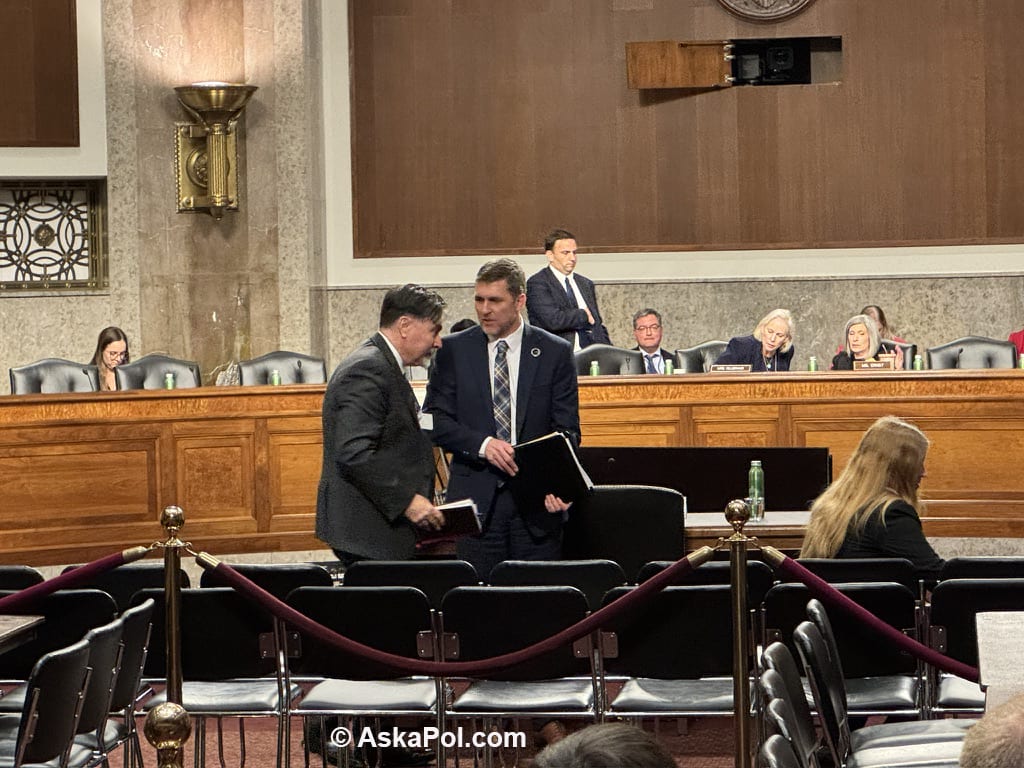
Who?
Sen. Kirsten Gillibrand (D-NY) — Chair, Armed Services Subcommittee on Emerging Threats & Capabilities
When?
Nov. 19, 2024 — directly following the public Senate UAP hearing with the Pentagon’s All-Domain Anomaly Resolution Office (AARO) Director Jon Kosloski
LISTEN: Laslo & Gillibrand
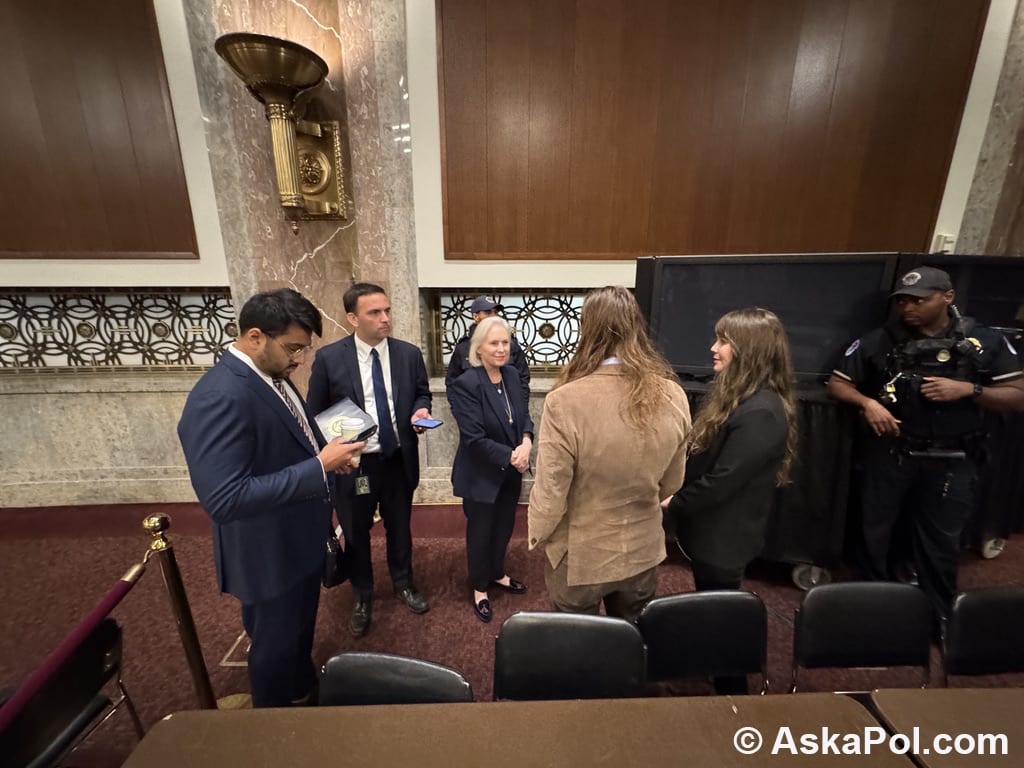
Ask a Pol asks:
Knowing former AARO Director Sean Kirkpatrick was under pressure from you and other Intelligence Committee members because whistleblowers didn’t trust his office, what makes you confident Director Kosloski has righted the ship?
Key Gillibrand:
“It's going to happen. I think the fact that he's already talked to two whistleblowers with firsthand information — those are whistleblowers who would not come in before. It just gives us another lens of information,” Sen. Kirsten Gillibrand exclusively tells Ask a Pol. “The report that AARO issued, is everything that they were told to date. That's everything, and so if the stuff that someone worked on is not in that report, they need to come in to tell AARO, because it means they haven't been told about it.”
What’s next?
“It's over the base — if it's over a sensitive site, I want to create authority for them to take down,” Gillibrand says. “An object that doesn't do anything, it's not showing hostile intent but it's a huge national security breach, and so we want to update the law to say this is a huge national security breach and we may take them down on that basis alone. They don't have to shoot at you. They don't have to drop a chemical weapon. They don't have to drop a nuclear weapon. You could just take them down, because they are clearly spying.”
Caught our ear:
“I don't think it needs a makeover. They were able to use the money and time that they had over the last year and a half, to get the lay of the land, to get all the historic data culminated, to create procedures and frameworks to get the public to be able to give data and information. They were able to create scientific measures to do the analysis. All the purpose of AARO, so no time has been wasted, which I'm very grateful for,” Gillibrand tells us. “And sometimes you need an organization to develop a little bit of maturity before the whistleblower community will feel comfortable anyway, and so I feel like they've done the hard work to create a infrastructure around assessing and documenting information so now that they can have trust in the system.”
Below find a rough transcript of Ask a Pol’s exclusive interview with Sen. Kirsten Gillibrand, slightly edited for clarity.
TRANSCRIPT: Sen. Kirsten Gillibrand
SCENE: After wrapping up her public UAP hearing in the Senate Armed Services Subcommittee on Emerging Threats & Capabilities on Nov. 19, 2024, Ask a Pol’s Matt Laslo catches up with Chair Gillibrand — as some of the 16 audience members wait to thank the senator — inside the hearing room as two Capitol Police Officers look on.
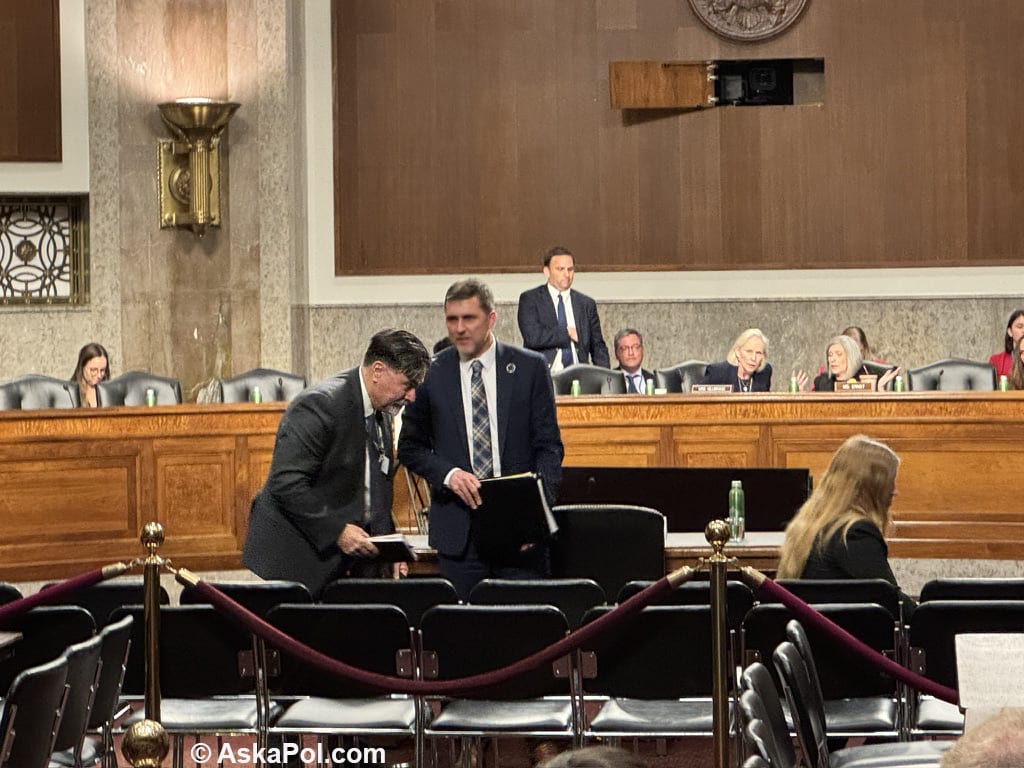
Matt Laslo: “How are you, ma’am?”
Kirsten Gillibrand: “Good.”
ML: “I'm just here to ask you about Dr. Oz.”
Laslo jokes about the news that broke during the hearing that President-elect Donald Trump tapped Dr. Mehmet Oz to be his Centers for Medicare and Medicaid Services (CMS) administrator.
KG: “I don't know anything about that.”
ML: “Have you heard? He got nominated for Medicare…”
KG: “I didn’t hear that. What's his job?”
ML: “Medicare and Medicaid.”
KG: “Oh, interesting.”
ML: “Right? Ummm, how do you think this went?”
KG: “I think it was great.”
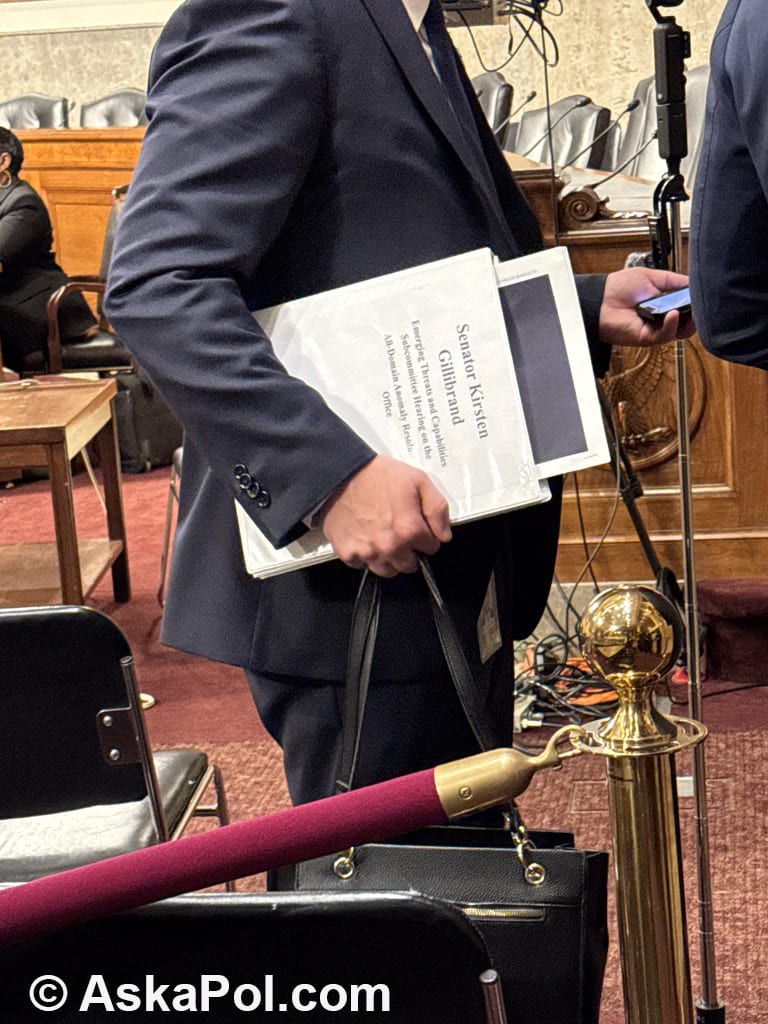
ML: “Yeah? Why’s that?”
KG: “I really liked it, because AARO could show — particularly to the scientific community, as well as the whistleblower enthusiast community — we take all these cases very seriously. And what I really liked is the three examples he used of things we were able to figure out. He shows how we figured it out, so that, you know, if there's 100,000 cases, we’re gonna be able to figure out half of them to be things like that.”
ML: “Ahuh?”
KG: “But there's gonna be another half that we don't have enough data information, we don't know what it is and that we're just as interested in the ones we figure out as the ones we don't figure out, and so we have to keep getting more data and information to layer on top of it to know. And that it's a safe place to come forward, and that if there's programs that people have participated in that we don't know about, that aren't disclosed in the historic document, that we need to know about that — like the historic document is everything that AARO could assess and document so far, and so for these whistleblowers, if they worked on something that's not in that document, that's interesting. They should come in and see AARO.”
Every bit helps!!! Consider chipping in to support our independent journalism — Venmo, PayPal, Cash App — or just buy us a beer!
ML: “Now I know you sat down with Kirkpatrick, so did [Sen. Mike] Rounds, so did [Intel Vice-chair Marco] Rubio and [Intel Chair Mark] Warner, pressuring him because whistleblowers didn't trust AARO. Do you think this goes a long way in helping that….?”
KG: “Yes!
ICYMI — Kirkpatrick left AARO under pressure from Senate
SUBSCRIBER-ONLY CONTENT*
*Student? Lost your gig? Hard times? Been there. Got you. No questions asked. Just ping us.
ML: “And what more needs to be done so that…?”
KG: “I think it's going to happen. I think the fact that he's already talked to two whistleblowers with firsthand information — those are whistleblowers who would not come in before. It just gives us another lens of information. The report that we issued — or, the report that AARO issued is everything that they were told to date. That's everything, and so if the stuff that someone worked on is not in that report, they need to come in to tell AARO, because it means they haven't been told about it.”
ML: “And do you — it was interesting, he didn't really say funding was the problem, like, how much, because AARO wasn't trusted, it seems like they have to really work on this makeover and he's saying resources aren’t needed for that…”
KG: “I don't think it needs a makeover. They were able to use the money and time that they had over the last year and a half, to get the lay of the land, to get all the historic data culminated, to create procedures and frameworks to get the public to be able to give data and information. They were able to create scientific measures to do the analysis. All the purpose of AARO, so no time has been wasted, which I'm very grateful for. And sometimes you need an organization to develop a little bit of maturity before the whistleblower community will feel comfortable anyway, and so I feel like they've done the hard work to create a infrastructure around assessing and documenting information so now that they can have trust in the system.”
ML: “And the Langley — after the Langley incursion and then that Wall Street Journal piece on it, have more of your colleagues been bringing it up to you?”
KG: “Yes.”
ML: “Yes?”
KG: “Because the Langley example is just, it's an obvious example of how this is a national security priority, and the fact that they didn't readily know what technology was being used is deeply upsetting to me.”
ML: “Yeah?”
KG: “So AARO, thank goodness, still has a role in those even though they know it's a drone. So AARO is supposed to assess, is it a drone? Is it a balloon? Is it something other? The fact they know it's a drone, would initially say that AARO’s not gonna be involved. But the fact they didn't know what technology the drone was using, it means that AARO can be evolved, which is very important to me because I think AARO is gonna be able to do better scientific analysis more quickly than anyone else.”
ML: “Because one thing Sen. Kaine pushed the heads of NORTHCOM and SOUTHCOM on was that the Pentagon doesn’t really have rules of for engagement around [suburban] spots like Langley…”
KG: “So I have a bill — Sen. Tom Cotton, we're trying to get added to it.”
Gillibrand turns to her aide.
KG: “It's not been introduced yet, has it?”
Gillibrand aide: “Not as a stand alone.”
KG: “Okay, it's going to be introduced — when?”
Gillibrand turns to her aide again.
Gillibrand aide: “We were hoping for this week. It might need to be in December.”
KG: “Okay, so we're going to introduce a bill shortly to give authority to these bases to take these down.”
ML: “Interesting but how complicated is that over suburban areas?”
KG: “Well, they're not. They're over the base.”
ML: “Oh yeah — when it’s over the base?”
KG: “It’s over the base. Over the base, over the base, over the base, over the base.”
ML: “Yeah.”
KG: “It's over the base — if it's over a sensitive site, I want to create authority for them to take down.”
ML: “Because I know Sen. [Mark] Kelly brought it up with the incursions over the Luke Force Base in Arizona — none of these objects have been shot down?”
KG: “No, because unless — so an object that doesn't do anything, it's not showing hostile intent but it's a huge national security breach, and so we want to update the law to say this is a huge national security breach and we may take them down on that basis alone. They don't have to shoot at you. They don't have to drop a chemical weapon. They don't have to drop a nuclear weapon. You could just take them down, because they are clearly spying. And now that — when that law was written, we didn't have all the technology in drone tech or in, you know, signals intelligence tech, that now if a drone is flying over a base, they're definitely collecting information.”
ML: “Have you worked with the Pentagon on that?”
KG: ”Yeah, yeah.”
ML: “I can see people there not liking it.”
KG: ”No, no. They want to be able to take it down.”
ML: “Interesting.”
KG: “They just don't have the authority.”
ML: “Interesting. I’ll be watching. Preciate you ma’am.”
KG: “Okay.”
Content posted at AskaPol.com is copyrighted. Use our original content to move the story forward. And, please, link to us.

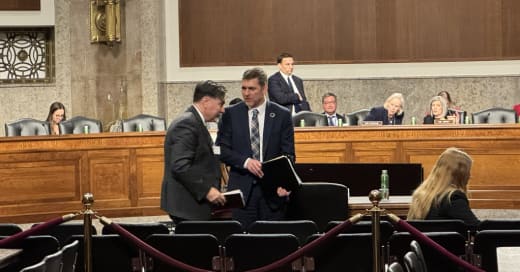


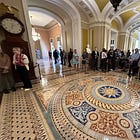









Share this post